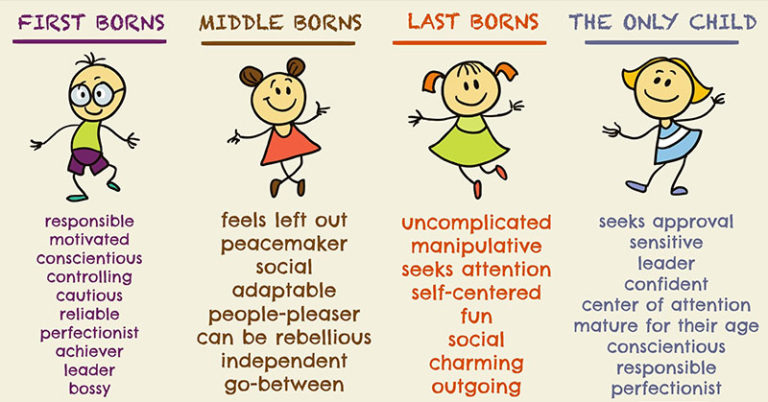According to the poem Monday’s Child, Wednesday’s child is full of woe, and Thursday’s child has far to go. According to some psychologists, however, it’s not on which day you were born that shapes your personality, but your birth order.
There are a number of theories as to why this is the case. Most center around the fact that parents will raise their kids differently depending on their level of experience as parents. Couple that with the relationship to their other siblings, and there appears to be some validity to it.
This also may in part explain how siblings, who share all the same genes and the same parents, could grow up to have such wildly varying personalities.
So which child are you, and how well does the scientific theory describe your personality?
First Born
In many ways, the first-born child “teaches” their parents how to be parents. Often, this means that they will approach many decisions with caution, and use a lot of trial-and-error in their parenting style.
New parents have a tendency to be a bit over-the-top, and are typically highly attentive. They will often be stricter when enforcing rules, and be very by-the-book. For this reason, some experts say this can cause the firstborn child to be a perfectionist. They will often be eager to please their parents, and tend to mature very quickly.
Some firstborn traits are:
- Reliable
- Conscientious
- Structured
- Cautious
- Controlling
- Achievers
Frank Farley, Ph.D., a psychologist at Temple University, in Philadelphia, says that firstborns are more likely to be overachievers because of the undivided attention they receive from their parents.
“Many parents spend more time reading and explaining things to firstborns. It’s not as easy when other kids come into the picture,” he explains [1].
For this reason, firstborns tend to score higher on IQ tests. This high degree of success often leads them to perfectionism, and firstborns can have trouble cutting themselves any slack.
“They often have an intense fear of failure, so nothing they accomplish feels good enough,” says Michelle P. Maidenberg, Ph.D., a child and family therapist in White Plains, New York [1].
This can sometimes make them inflexible, and hesitant to step out of their comfort zone.
Middle Child
With a second child, the parents now have to split their time between two kids. This means that they may be slightly less attentive, and possibly less strict about the rules. In some cases, this can cause the second child to be a people-pleaser, since they may not get as much attention as their older or younger siblings.
“The middle child often feels left out and a sense of, ‘Well, I’m not the oldest. I’m not the youngest. Who am I?'” says therapist Meri Wallace [1].
For this reason, middle children might be more social or popular among their peers. Some middle child personality traits are:
- People-pleasers
- Somewhat rebellious
- Thrives on friendships
- Has large social circle
- Peacemaker
Middle children tend to have a more go-with-the-flow kind of personality. This is possibly because they are constantly negotiating and compromising in order to fit in within the family. They also tend to form stronger bonds with their peers, since they receive less attention at home.
Sometimes, however, middle children can have difficulty because they feel they’re not valued.
“It’s easy for them to be left out and get lost in the shuffle,” says Maidenberg [1].
Last Born
The youngest child in the family tends to be the most free-spirited. This is likely because their parents have adopted a much more relaxed style of parenting than was used with their older siblings.
Some personality traits of the youngest child might be:
- Fun-loving
- Uncomplicated
- Manipulative
- Outgoing
- Attention-seeker
- Self-centered
According to some psychologists, lastborns are not always the strongest or the smartest, so they win attention other ways. They tend to be more outgoing and social, and more open to unconventional experiences.
Where the youngest can sometimes struggle is feeling like nothing they do is important.
“None of their accomplishments seem original,” explains psychologist Dr. Kevin Leman. “Their siblings have already learned to talk, read, and ride a bike. So parents react with less spontaneous joy at their accomplishments and may even wonder, ‘Why can’t he catch on faster?'” [1]
The Only Child
Only children are in a unique position. They are the sole receiver of their parents’ attention and resources for their entire lives. This means that all of their parents’ support (and expectations) rest on their shoulders. This, as you can imagine, can be both a good and a bad thing.
Personality traits of only children might be:
- Mature for their age
- Perfectionists
- Conscientious
- Diligent
- Leaders [1]
Does Birth Order Really Affect Personality?
While this theory does seem to make a lot of sense, not everyone in the psychology world agrees with it.
Alfred Adler, a late nineteenth and early twentieth psychotherapist, believed in the theory of birth order. He considered first borns to be neurotic. This was because for years they were the sole receivers of their parents’ attention, and then were essentially dethroned.
He thought the youngest were more ambitious, and the middle children were more emotionally stable.
Psychologist Frank J. Sulloway found that more revolutionary leaders were last-borns. This, he said, was because older children have less reason to reject the status quo. They are more likely to identify with the world view of their parents.
The youngest, on the other hand, are less sure of their parents’ view. This makes them more likely to choose an alternative path [2].
There are also some studie to support the theory of birth order. An older 1968 study found that first-borns were less likely to participate in dangerous sports than their younger siblings [3]. Another study from 1980 showed firstborns had lower anxiety and higher ego [4].
Several of these studies, however, have been criticised for using questionable methods. The biggest problem was they were only conducted at one point in time. Older siblings, then, were not only firstborn, but they were also older. Children’s personalities will of course change somewhat as they grow up, and that is not taken into account.
Another issue is that only one person was judging their own personality and that of their siblings. The perception you have of yourself will differ from the perception others have of you, and you have of others. This makes the reporting somewhat unreliable.
When scientists instead analysed large amounts of data, comparing several different families, the theory of birth order disappeared almost completely.
Evidence to the Contrary
In 2015, researchers in Germany looked at data from over twenty thousand people across several countries. They did not find any systematic differences in personality [5].
Other researchers have pointed out that there are other factors at play that could affect the theory. The size of one’s family, for example, affects birth order. The more siblings there are, the more later-borns there are.
Frank Spinath, a psychologist at Saarland University in Germany, says that it is possible that birth order affects personality, but not in every family in the same way.
“In other words, there may be an influence but not a systematic one,” he said [2].
He also pointed out that parents do not treat each child the same regardless of their birth order. Studies show that parents react to the temperament of their children, and raise them accordingly.
Ralph Hertwig, a psychologist at the Max Planck Institute for Human Development in Berlin, tried to find evidence to support the theory of birth order, but couldn’t. Several large studies over the last few years have mounted evidence against it.
“There seems to be a growing consensus that birth order does not influence personality in a way that can be measured in adulthood,” Hertwig said [6].
Hertwig’s study looked specifically at risk-taking. According to the theory of birth order, the youngest sibling should be more apt to take risks. For the study, they put participants through about forty psychological tests. They asked them questions about driving too fast or having unprotected sex, for example.
They also had them perform some experiments. For example, they gave them ten dollars with two options: they could keep the money, or gamble it for one hundred. The results? Birth order does not affect propensity toward risky behavior.
First-Borns and Intelligence
One area that does appear to be affected is intelligence. Several studies have shown that first-borns typically have slightly higher IQs than their younger siblings. This difference, however, is marginal.
One possible explanation for this is that parents provide more mental stimulation to their first child because they don’t have to divide their attention among multiple kids [6].
The Bottom Line
The issue with the theory of birth order is that there are so many confounding factors that might influence a child’s personality. This makes it very difficult to isolate one factor. Hertwig says that it is possible that birth order affects personality during childhood, but it seems that impact vanishes in adulthood.
“Birth order research is 100 years old,” Hertwig said. “We are getting closer and closer to the truth. But I wouldn’t say yet that we have fully understood the true picture.” [6]
Keep Reading: What The Last Digit Of Your Birth Year Can Reveal About You
Sources:
- ‘Birth Order Traits: Your Guide to Sibling Personality Differences’ Parents Jocelyn Voo. Published July 30, 2020
- ‘Does Birth Order Affect Personality?’ Scientific American By Corinna Hartmann, Sara Goudarzi. Published August 8, 2019
- ‘Birth order and participation in dangerous sports.’ Psyc Net Richard E Nesbett. Published 1968.
- ‘Birth Order, Family Structure and Personality Variables’ T&F Online Edgar Howarth. Published Jun 10, 2010.
- ‘Examining the effects of birth order on personality’ PNAS Julia M. Rohrer, Boris Egloff, tefan C. Schmukle. Published November 17, 2015.
- ‘Birth order may not shape personality after all’ Washington Post Ben Guarino Published March 14, 2019.
This article originally appeared on The Hearty Soul in September 2020, and has been published here with permission.
Editors Note (09/23/2020): A version of this article was originally published in September 2016, but has been republished to reflect current editorial standards. Edits and updates have have been made throughout with the goal of providing the latest evidence regarding birth order and personality.

